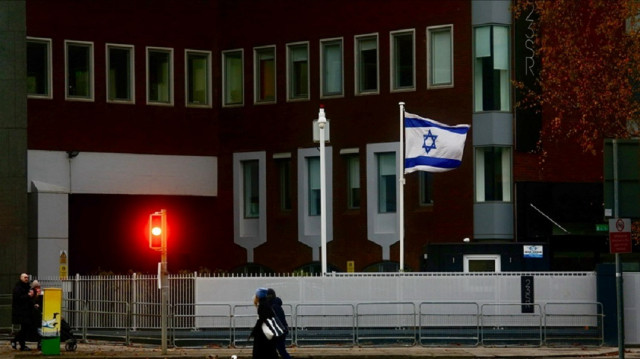The Israeli Embassy in Dublin took down its national flag on Friday, signaling the initial steps toward its closure. This action follows an announcement by Israeli Foreign Minister Gideon Saar, who cited alleged “antisemitic rhetoric” from Ireland as the primary reason for the decision—a claim Dublin has firmly denied.
The flag was removed from the embassy’s premises on Shelbourne Road, Ballsbridge, shortly after Saar’s statement. A spokesperson for the Israeli Embassy confirmed the removal, stating: “The flag was taken down following the instruction of the foreign minister to close the embassy.” However, the embassy has not yet been officially shut down, according to the spokesperson.
Israel Criticizes Ireland’s Stance on Palestine
The closure stems from escalating tensions between Israel and Ireland over Middle East policies. Saar criticized Ireland’s recognition of a Palestinian state and accused the Irish government of attempting to redefine “genocide” in international law to support Palestinian claims at the International Court of Justice. This diplomatic rift has further strained relations between the two countries.
Irish Government Rejects Antisemitism Accusation
Irish Taoiseach Simon Harris dismissed claims of anti-Israel sentiment, asserting Ireland’s commitment to human rights, international law, and peace. Speaking from Brussels during an EU meeting focused on Ukraine, Harris emphasized: “The people of Ireland, the government of Ireland – this one and the next one – are not anti-Israeli. But we are pro-human rights, we are pro-international law, we are pro-peace, and we will never be intimidated or silenced into moving away from that.”
Harris reiterated Ireland’s foreign policy priorities, denying accusations of bias against Israel. He highlighted that Ireland’s approach aligns with its long-standing principles of promoting international peace and justice.
Legislative Implications: Occupied Territories Bill
The controversy also brings attention to Ireland’s proposed Occupied Territories Bill, which seeks to penalize trade involving goods or services originating from Israeli settlements in Palestinian territories. Harris expressed hope that the bill would pass in 2025 but noted that the formation of a new Irish government in January could affect its timeline. If enacted, the legislation would mark a significant development in Ireland’s stance on the Israeli-Palestinian conflict.
Wider Diplomatic Impact
The closure of the Israeli Embassy in Dublin underscores the deepening divide between Israel and Ireland. While Israel views the Irish government’s actions as antagonistic, Ireland maintains that its policies are grounded in upholding international law and human rights. The incident also reflects broader tensions in Europe over Middle East diplomacy, with Ireland positioning itself as a strong advocate for Palestinian rights.
As the diplomatic fallout continues, the future of Israel-Ireland relations remains uncertain. The Israeli Embassy’s closure, once finalized, will mark a turning point in the already fraught bilateral ties, potentially influencing broader EU-Israel relations.
Related Stories:
Ireland won’t be silenced over Israel’s war on Gaza, says the prime minister
Ireland Supports South Africa’s ICJ Case Against Israel
Ireland Appoints First Full Ambassador from Palestine
















